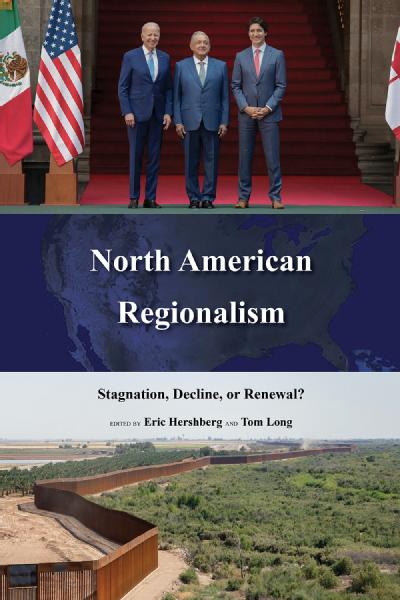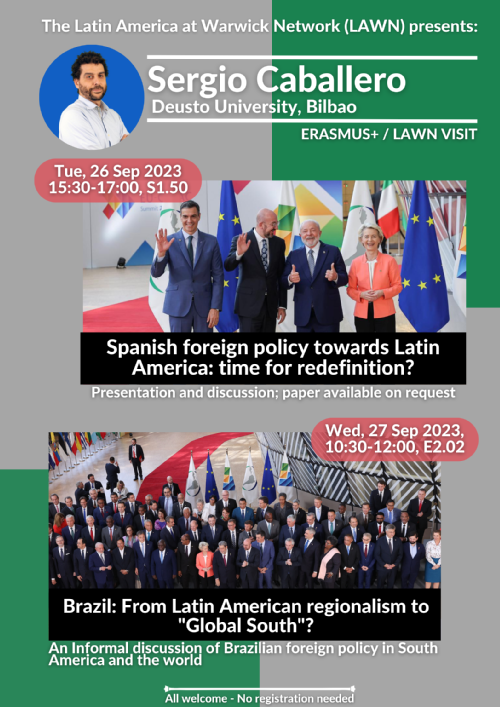News
New book on North America in a world of regions
 North American Regionalism: Stagnation, Decline, or Renewal?, edited by Tom Long and Eric Hershberg (American University), was published on 1 December by University of New Mexico Press. Although North America was a central case in the development of IR’s study of regionalism in the early 1990s, the region has garnered less attention in recent years—even as the study of regions in IR dramatically expanded. This volume reconnects North America with this body of scholarship, asking both what the North American case can contribute to how IR scholars understand regionalism, and what new currents in IR can help us understand about North America. It includes the work of scholars from Canada, Mexico, the United States, and Europe, with themes including region-building, migration, security, trade, and institutions. The book is the culmination of the Robert A. Pastor North American Research Initiative, a multinational research network based at American University and chaired by Tom Long since 2016.
North American Regionalism: Stagnation, Decline, or Renewal?, edited by Tom Long and Eric Hershberg (American University), was published on 1 December by University of New Mexico Press. Although North America was a central case in the development of IR’s study of regionalism in the early 1990s, the region has garnered less attention in recent years—even as the study of regions in IR dramatically expanded. This volume reconnects North America with this body of scholarship, asking both what the North American case can contribute to how IR scholars understand regionalism, and what new currents in IR can help us understand about North America. It includes the work of scholars from Canada, Mexico, the United States, and Europe, with themes including region-building, migration, security, trade, and institutions. The book is the culmination of the Robert A. Pastor North American Research Initiative, a multinational research network based at American University and chaired by Tom Long since 2016.
Does Monroe still matter?
As the Monroe Doctrine marks 200 years since it was first enunciated, the time-worn US policy is back in the news. In a new article in Foreign Policy magazine, PAIS’s Tom Long and Carsten-Andreas Schulz (Cambridge) examine the many meanings of the Monroe Doctrine and argue that it provides a poor guide for US-Latin American relations today. In doing so, they draw on their joint AHRC-funded project, “Latin America and the peripheral origins of nineteenth century international order.”https://foreignpolicy.com/2023/12/16/monroe-doctrine-united-states-latin-america-foreign-policy-interventionism-china-gop/Link opens in a new window
LAWN-EASG Talk: Diego Telias on Strategies Towards a Great Power: Government Alignment with China's
Diego Telias is currently a PhD candidate in Political Science at the Pontificia Universidad Católica de Chile, academic collaborator of the Centre for Asian Studies at the same university, and editorial assistant of the Revista de Ciencia Política. He is also an Associate Researcher of the Millennium Nucleus on the Impacts of China in Latin America (ICLAC). His areas of interest are foreign policy analysis and Latin America-East Asia relations.LAWN-EASG Talk: This talk explores the complex dynamics arising from the ascent of China and how countries, whether neighboring states or middle powers, position themselves toward this great power. Why have certain governments imposed bans on Chinese companies in 5G bidding processes while others have refrained from such actions? Or why do countries adopt contrasting positions when faced with allegations of human rights violations in Xinjiang? This investigation compares two pairs of countries from different regions (Chile - Uruguay in Latin America and the Czech Republic - Hungary in Central Europe) and through an in-depth analysis of official documents and 120 interviews, analyses if economic leverage, a crucial factor mentioned in the literature, is the main explanation that influences those positions.
Date: Tuesday, 28th NovemberTime: 14:00 -15:30Venue: E2.02, Social Sciences Building
EASG Talk with Dr. Catherine Jones on Anxious Allies: US engagements in East Asia
Catherine Jones is a lecturer at the University of St Andrews, previously she was a research fellow at the University of Warwick (2012-2018) and received her PhD from the University of Reading. Her research focuses on three areas of work: (1) agency of East Asian states in international order including China's engagement with global order, (2) the China-North Korea relationship, (3) and the politics and development in Southeast Asia. Across these areas she has incorporated wargames and wargaming into her teaching and as an analytical tool for her research. In this context she has particular interests in engaging with diverse perspectives and incorporating voices from less prominent parts of the world.Catherine's talk addresses a critical gap in current literature by highlighting the importance of emotions in understanding alliance dynamics and management. It explores how the wider context, shaped by emotions among the parties, particularly anxiety, heightened tensions and fear, can impact alliance management. In contexts with heightened emotions, reassurance may be more challenging, contrasting with situations lacking an anxious state. This talk draws upon a range of examples in Northeast Asia to demonstrate the variety of effects of anxiety in alliances, providing significant insights for both policy and theory.
Date: Thursday, 23/11/2023Time: 16:15-17:30Venue: Social Sciences Building, Room A0.23
Erasmus+/LAWN visit: Sergio Caballero
The Latin America at Warwick Network (LAWN) is hosting Sergio Caballero, an Erasmus+ scholar from the University of Deusto in Bilbao, Spain. Dr. Caballero is associate professor of international relations and the UNESCO Chair for Latin America. His research has focused on EU-Latin American relations, Brazilian foreign policy, and Latin American regionalism. During his visit, he will present one paper and host an informal discussion of Brazilian foreign policy today (details below). He is also keen on meeting colleagues and students, with shared interests.
For more information, please contact Tom Long (T.Long.1@warwick.ac.uk).
Spanish foreign policy towards Latin America: time for redefinition?
Presentation and discussion; paper available on request
Tue, 26 Sep 2023, 15:30-17:00, S1.50
Brazil--From Latin American regionalism to "Global South"?
An Informal discussion of Brazilian foreign policy in South America and the world
Wed, 27 Sep 2023, 10:30-12:00, E2.02

